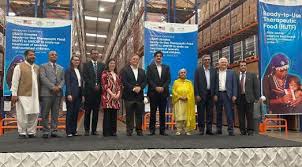United States Provides 486 Metric Tons of Lifesaving Nutrition Aid to UNICEF for 29,000 Malnourished Children in Pakistan

Karachi: In a landmark effort to save the lives of Pakistani children at risk of dying from malnutrition, the United States has delivered 486 metric tons of Ready-to-Use Therapeutic Food (RUTF) to UNICEF. U.S. Ambassador to Pakistan Donald Blome handed over the lifesaving aid at a ceremony in Karachi.
This vital support will benefit more than 29,000 children suffering from severe acute malnutrition in the flood-affected regions of Sindh and Balochistan.
“Today’s handover is a powerful testament to the United States’ enduring commitment to the Pakistani people, to Pakistani women and children, and to vulnerable communities,” Ambassador Blome said. “We must act with urgency to address this crisis and save the lives of an entire generation of Pakistani children.”
The Ambassador commended front-line health care workers, women’s and maternal health care providers, social service providers, doctors, and volunteers whose tireless efforts have saved the lives of thousands of women and children, and expressed gratitude and appreciation to the Provincial Health Minister, health department, UNICEF, and other nutrition partners for their work to confront Pakistan’s severe, acute malnutrition crisis.
RUTF, a nutrient-rich paste made from peanuts, sugar, milk powder, oil, vitamins, and minerals, is essential for treating severe acute malnutrition. This donation underscores the U.S. government’s dedication to alleviating malnutrition and its long-term impacts.
Since 2022, the United States has provided nearly $100 million in aid to Pakistan to address malnutrition, with almost $15 million allocated to treat severely malnourished children. The assistance delivered today provides tens of thousands of at-risk children the basic nutrition they need to grow and live a healthy, productive life.
US initiatives to address Pakistan’s severe, acute malnutrition crisis not only address immediate nutritional needs but also aim to enhance food security, access to clean water, and healthcare services, paving the way for sustainable development.
The event saw the participation of prominent officials, including the Chief Minister of Sindh, Syed Murad Ali Shah; Sindh Minister for Health and Population, Dr. Azra Fazal Pechuho; UNICEF Country Director, Mr. Abdullah A. Fadil; and community leaders. Their presence highlighted the collective effort required to tackle this pressing issue.





